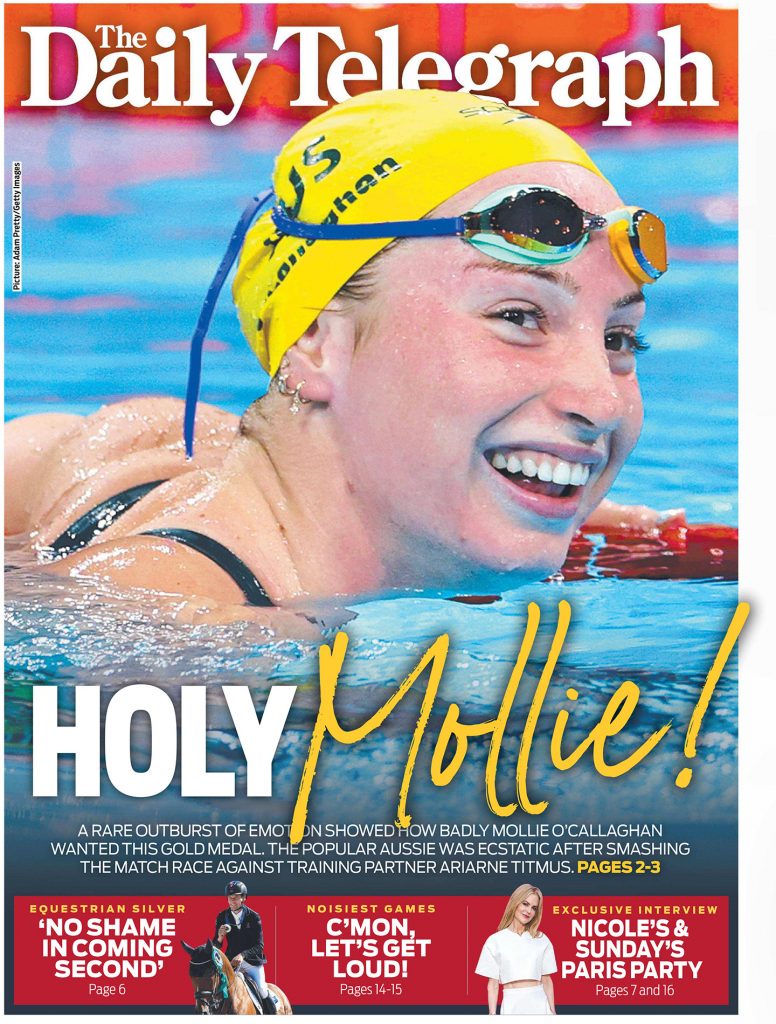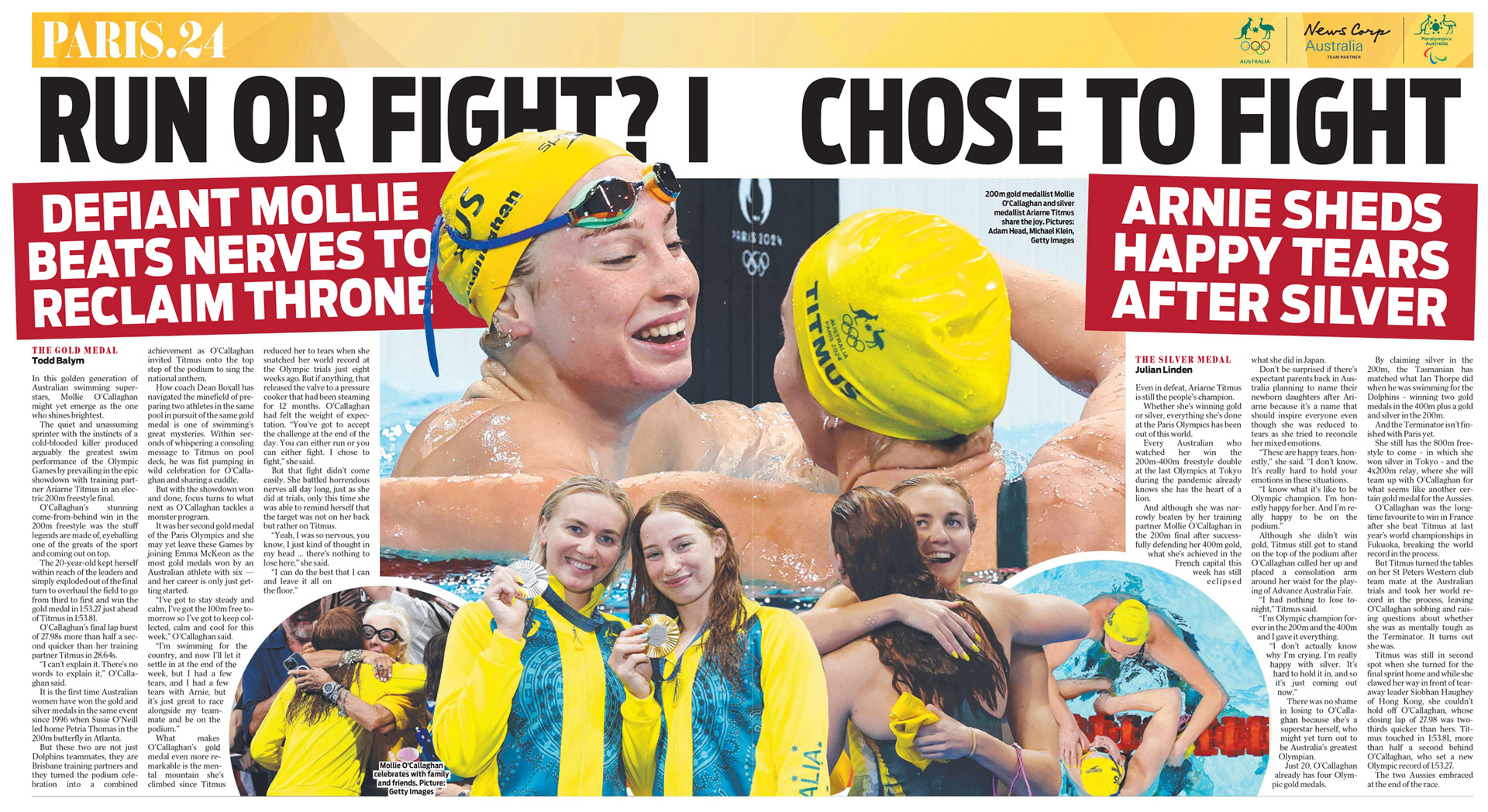
Article by Todd Balym & Julian Linden, courtesy of The Daily Telegraph.
DEFIANT MOLLIE BEATS NERVES TO RECLAIM THRONE
THE GOLD MEDAL
In this golden generation of Australian swimming superstars, Mollie O’Callaghan might yet emerge as the one who shines brightest.
The quiet and unassuming sprinter with the instincts of a cold-blooded killer produced arguably the greatest swim performance of the Olympic Games by prevailing in the epic showdown with training partner Ariarne Titmus in an electric 200m freestyle final.
O’Callaghan’s stunning come-from-behind win in the 200m freestyle was the stuff legends are made of, eyeballing one of the greats of the sport and coming out on top.
The 20-year-old kept herself within reach of the leaders and simply exploded out of the final turn to overhaul the field to go from third to first and win the gold medal in 1:53.27 just ahead of Titmus in 1:53.81.
O’Callaghan’s final lap burst of 27.98s more than half a second quicker than her training partner Titmus in 28.64s.
“I can’t explain it. There’s no words to explain it,” O’Callaghan said.
It is the first time Australian women have won the gold and silver medals in the same event since 1996 when Susie O’Neill led home Petria Thomas in the 200m butterfly in Atlanta.
But these two are not just Dolphins teammates, they are Brisbane training partners and they turned the podium celebration into a combined achievement as O’Callaghan invited Titmus onto the top step of the podium to sing the national anthem.
How coach Dean Boxall has navigated the minefield of preparing two athletes in the same pool in pursuit of the same gold medal is one of swimming’s great mysteries. Within seconds of whispering a consoling message to Titmus on pool deck, he was fist pumping in wild celebration for O’Callaghan and sharing a cuddle.
But with the showdown won and done, focus turns to what next as O’Callaghan tackles a monster program.
It was her second gold medal of the Paris Olympics and she may yet leave these Games by joining Emma McKeon as the most gold medals won by an Australian athlete with six — and her career is only just getting started.
“I’ve got to stay steady and calm, I’ve got the 100m free tomorrow so I’ve got to keep collected, calm and cool for this week,” O’Callaghan said.
“I’m swimming for the country, and now I’ll let it settle in at the end of the week, but I had a few tears, and I had a few tears with Arnie, but it’s just great to race alongside my teammate and be on the podium.”
What makes O’Callaghan’s gold medal even more remarkable is the mental mountain she’s climbed since Titmus reduced her to tears when she snatched her world record at the Olympic trials just eight weeks ago. But if anything, that released the valve to a pressure cooker that had been steaming for 12 months. O’Callaghan had felt the weight of expectation. “You’ve got to accept the challenge at the end of the day. You can either run or you can either fight. I chose to fight,” she said.
But that fight didn’t come easily. She battled horrendous nerves all day long, just as she did at trials, only this time she was able to remind herself that the target was not on her back but rather on Titmus.
“Yeah, I was so nervous, you know, I just kind of thought in my head … there’s nothing to lose here,” she said.
“I can do the best that I can and leave it all on the floor.”
ARNIE SHEDS HAPPY TEARS AFTER SILVER
THE SILVER MEDAL
Even in defeat, Ariarne Titmus is still the people’s champion.
Whether she’s winning gold or silver, everything she’s done at the Paris Olympics has been out of this world.
Every Australian who watched her win the 200m-400m freestyle double at the last Olympics at Tokyo during the pandemic already knows she has the heart of a lion.
And although she was narrowly beaten by her training partner Mollie O’Callaghan in the 200m final after successfully defending her 400m gold, what she’s achieved in the French capital this week has still eclipsed what she did in Japan.
Don’t be surprised if there’s expectant parents back in Australia planning to name their newborn daughters after Ariarne because it’s a name that should inspire everyone even though she was reduced to tears as she tried to reconcile her mixed emotions.
“These are happy tears, honestly,” she said. “I don’t know. It’s really hard to hold your emotions in these situations.
“I know what it’s like to be Olympic champion. I’m honestly happy for her. And I’m really happy to be on the podium.”
Although she didn’t win gold, Titmus still got to stand on the top of the podium after O’Callaghan called her up and placed a consolation arm around her waist for the playing of Advance Australia Fair.
“I had nothing to lose tonight,” Titmus said.
“I’m Olympic champion forever in the 200m and the 400m and I gave it everything.
“I don’t actually know why I’m crying. I’m really happy with silver. It’s hard to hold it in, and so it’s just coming out now.”
There was no shame in losing to O’Callaghan because she’s a superstar herself, who might yet turn out to be Australia’s greatest Olympian.
Just 20, O’Callaghan already has four Olympic gold medals.
By claiming silver in the 200m, the Tasmanian has matched what Ian Thorpe did when he was swimming for the Dolphins – winning two gold medals in the 400m plus a gold and silver in the 200m.
And the Terminator isn’t finished with Paris yet.
She still has the 800m freestyle to come – in which she won silver in Tokyo – and the 4x200m relay, where she will team up with O’Callaghan for what seems like another certain gold medal for the Aussies.
O’Callaghan was the longtime favourite to win in France after she beat Titmus at last year’s world championships in Fukuoka, breaking the world record in the process.
But Titmus turned the tables on her St Peters Western club team mate at the Australian trials and took her world record in the process, leaving O’Callaghan sobbing and raising questions about whether she was as mentally tough as the Terminator. It turns out she was.
Titmus was still in second spot when she turned for the final sprint home and while she clawed her way in front of tearaway leader Siobhan Haughey of Hong Kong, she couldn’t hold off O’Callaghan, whose closing lap of 27.98 was two thirds quicker than hers. Titmus touched in 1:53.81, more than half a second behind O’Callaghan, who set a new Olympic record of 1:53.27.
The two Aussies embraced at the end of the race.
















